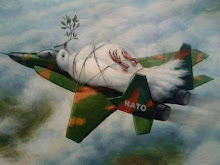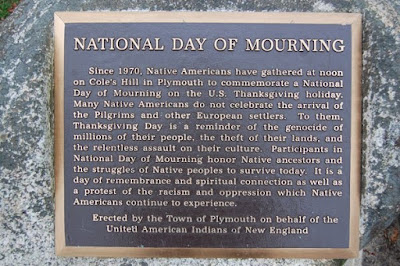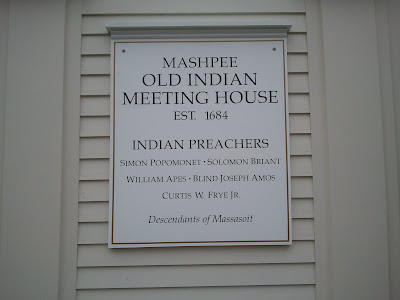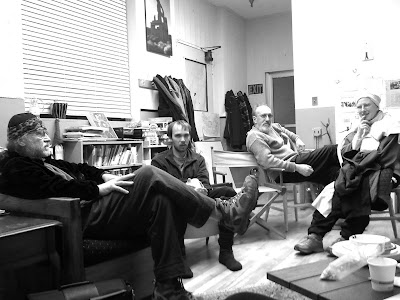WHEN THE REVOLUTION COMES YOU GOTTA BE READY
Thanks to fellow peace walker Christian Collins for this one. It's a Charlie Chaplin classic.
Bruce Gagnon is coordinator of the Global Network Against Weapons & Nuclear Power in Space. He offers his own reflections on organizing and the state of America's declining empire....

The collapsing US military & economic empire is making Washington & NATO even more dangerous. US could not beat the Taliban but thinks it can take on China-Russia-Iran...a sign of psychopathology for sure. We must all do more to help stop this western corporate arrogance that puts the future generations lives in despair. @BruceKGagnon


 Located near the Plymouth Rock monument
Located near the Plymouth Rock monument Our dinner stop on Thursday evening
Our dinner stop on Thursday evening This photo (thanks Vanessa) was taken yesterday morning as we prepared to leave the Smithfield Friends Meeting (Quaker) House in Rhode Island. I was stretching my legs. A wet snow had begun to fall. It was a 15-mile walk day. I did about 12 miles and took my turn driving the support vehicle. I got lost trying to find my way back to the walk after checking the mileage to our final destination last night.
This photo (thanks Vanessa) was taken yesterday morning as we prepared to leave the Smithfield Friends Meeting (Quaker) House in Rhode Island. I was stretching my legs. A wet snow had begun to fall. It was a 15-mile walk day. I did about 12 miles and took my turn driving the support vehicle. I got lost trying to find my way back to the walk after checking the mileage to our final destination last night.We've set the date of Monday, April 4 in Maine to have a news conference and rally inside the state capital (Hall of Flags) in Augusta, Maine. The event will begin at 11:00 am and is intended to call on all elected officials in our state (local, state, and federal) to begin to make the links between endless war spending and our economic crisis here at home.
Since 2001 the taxpayers of Maine have contributed $3.4 billion to the cost of war. One doesn't have to be a genius to know that those funds would have gone a long way in solving our current $800 million deficit here in our state.
In the days prior to the April 4 rally our Maine Campaign to Bring Our War $$ Home will be purchasing a large newspaper advertisement in the biggest paper in the state and buying radio time on a couple key stations in order to project this message out to a wider audience.
 Resting before pot luck/program in Worcester Photo by VV
Resting before pot luck/program in Worcester Photo by VV

Except for yesterday's surge of students it has usually been 7-10 of us walking at any one time. Today we picked up a couple new people (Vanessa Lynch and her dad for those in Maine who will remember her from our recent walks). Tomorrow we lose two of our folks who have to return to work. So it is an ebb and flow.
I've been massaging my feet and legs at every stop which has prevented them from getting too stiff. No blisters yet either. Today it was 50-some degrees with snow melting so lots of splashes as cars sped by us. Tomorrow we are forecasted to get 25 mile-per-hour winds and temperatures in the 20's so it should be bitter cold. Today was the first day I walked without long underwear. I'll have them back on in the morning for sure.
I highly recommend watching this video of a talk by Jim Douglass who wrote the highly regarded book called JFK and the Unspeakable: Why He Died & Why It Matters.
The peace walk is now in Keene, New Hampshire where we are staying at the Inter-faith Campus Ministry House. We met with a group of students from Keene State University tonight for a pot luck supper on the campus and had a nice discussion afterward.
We walked more than 12 miles today thru the beautiful rolling hills with mountains in the distance. Going up the hill I'd start sweating and coming down the hill I'd get cold again...the perfect way to get sick. So I spent much of the day zipping and unzipping my jacket.
Today's primary observation for me is cars and trucks. There are too many of them out there. People feel the power of their vehicle, its an illusory power though. They can step on the peddle and zoom take off like a rocket. They can cover a huge distance in seconds, what would take me walking many minutes with real effort. Many people get terribly impatient when they have to slow their chariot down because we are walking alongside the highway or crossing the road. We've interrupted their personal power machine and they don't like that. They are in a hurry to get some where and delays are not appreciated.
Walking though brings a totally different perspective on time. Power and acceleration are foreign concepts when you are walking - especially uphill. You are more conscious about the air quality and the noise levels which are severely impact by the car culture. You notice so many more things along the highway - like when I saw a man walk through the woods because he saw us coming or the dogs barking or the horses and cows reacting to us. Walking hurts because we are not used to it but it is the natural way for humans to move. Sadly like so many other things we are even losing our ability to walk.
Brother Kato is working on my right leg and foot again. Last night he spent an hour massaging and applying heat with Chinese medicine to my most painful spots. His treatment kept me walking today.

 The leaflet above (click on it for a better view) was advertising a protest I organized at the space center in Florida in 1989. This was during the period from 1987-1997 were we held one large protest after the other against the nuclearization and weaponization of space. Sometimes there were 500 people there, frequently about 1,000 came, and our biggest ever was more than 5,000.
The leaflet above (click on it for a better view) was advertising a protest I organized at the space center in Florida in 1989. This was during the period from 1987-1997 were we held one large protest after the other against the nuclearization and weaponization of space. Sometimes there were 500 people there, frequently about 1,000 came, and our biggest ever was more than 5,000.
Call it a shell game. Call it subterfuge. Call it illusion. Call it the magician at work again. Just call it for what it is - a sham.
 The protesters on the street in Egypt must be feeling intense anger and frustration since Mubarak announced tonight that he was not going anywhere. But I believe it is the tremendous success of their movement that is keeping Mubarak from leaving.
The protesters on the street in Egypt must be feeling intense anger and frustration since Mubarak announced tonight that he was not going anywhere. But I believe it is the tremendous success of their movement that is keeping Mubarak from leaving. Protesters at Gangjeong village wrote their hopes on wooden plaques near the naval base construction site. The sign says, “A place of peace and life, Gangjeong.” Photo courtesy Jon Walker
Protesters at Gangjeong village wrote their hopes on wooden plaques near the naval base construction site. The sign says, “A place of peace and life, Gangjeong.” Photo courtesy Jon Walker


Visit msnbc.com for breaking news, world news, and news about the economy

 That is me trying to find our house. They all look the same on the street today after our most recent snow blast. It took some time but I finally found it....the one with the bumperstickers on the cars.
That is me trying to find our house. They all look the same on the street today after our most recent snow blast. It took some time but I finally found it....the one with the bumperstickers on the cars.
 This morning we've learned via Al Jazeera TV that the Mubarak government has unleashed their secret police and thugs onto the peaceful people that have been gathered for days in the city square. There can be no doubt that despite milk-toast words about "democracy" and the "rule of law" from Obama, the U.S. has likely told Mubarak to take whatever steps are necessary to "regain stability" in his country. This would be the signal to use violence to disperse the people and to create division and fear as a strategy to quell the protest movement.
This morning we've learned via Al Jazeera TV that the Mubarak government has unleashed their secret police and thugs onto the peaceful people that have been gathered for days in the city square. There can be no doubt that despite milk-toast words about "democracy" and the "rule of law" from Obama, the U.S. has likely told Mubarak to take whatever steps are necessary to "regain stability" in his country. This would be the signal to use violence to disperse the people and to create division and fear as a strategy to quell the protest movement.